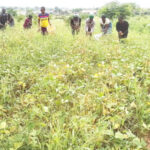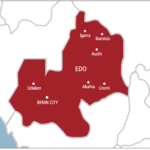When it comes to prospective revenue streams, pepper is one spice that many farmers have overlooked in favour of other crops.
However, those who discover chances in the popular hot-tasting spice are quietly lining their wallets with handsome profits.
After giving up on other crops since 2020, 29-year-old Terve Sugh, a chilli farmer in Gboko, Benue State, has turned his attention to pepper cultivation, which has put a significant amount of money in his pocket.
Some farmers in other parts of the North Central area, are also starting to focus more on growing peppers, which will increase the amount of the spice available in markets throughout the region and raise their income.
- You have no right to destabilise Nigeria, Akpabio warns Protesters
- There’s No more need for protest – FG
A lot of supply is coming in from Benue, Nasarawa and Kaduna states to a section of the Farin Gada Market in Jos, the Plateau State capital, dedicated to pepper sale, and thousands of customers are trooping into the market to make purchases daily.
The Daily Trust correspondent, who was at the market on Tuesday, witnessed a significant increase in buyers from different parts of the country coming in for the red pepper.
Two months ago, a bag was sold for N160,000 but as the harvested produce began to hit the markets a few weeks ago, the price has dropped to as low as N48,000 for the same quantity, while other hotter-tasting varieties are sold at between N50,000 and N55,000.
Abdulmalik Ibrahim Imam, a 28-year-old man in the business of buying and supplying pepper, told Daily Trust that prices are now seriously coming down as more harvests come to the market.
Despite the drop in prices, the farmers, dealers and consumers who spoke with Daily Trust said they are still very happy with the development.
About 18 trucks deliver pepper from neighbouring states to the markets daily, which serve as connecting hubs to other parts of the country.
However, Abdullahi Bala Hassan, one of the dealers, said prices may further drop if the issues around fuel supply are carefully handled.
“Fuel is a major issue affecting the price of pepper and other goods. Once something better is done around it, you will see prices even drop far below the current price,” he said.
For buyers like Mrs Ujia Abel, who buys in bulk to retail, says a drop in the price is a welcome development but hopes it will drop further so every Nigerian can easily afford it.
Although the nutritional benefits of pepper remain debatable in the health cycle, its consumption, with roasted meat, in soup, pepper soup, and many forms, is high in many homes, restaurants, hotels and barbecues across the country.
Many farmers, who see profit opportunity in the product, are making good money through its cultivation via both rain-fed and irrigation.
In Benue, more farmers are taking up the cultivation of pepper and boosting its supply to the various markets.
When Daily Trust also visited Kayarda, Madagwa, Alwaza and other surrounding villages in Lafia and Doma LGAs of Nasarawa State, it was discovered that farmers are getting more money into through farming and trading in pepper.
Although it is cultivated only during the rainy season in the villages, young farmers are strengthening their resource base through it. In fact, it is the first thing to be cultivated at the beginning of the rainy season.
Daily Trust spoke with some of the farmers who explained the many benefits of farming pepper in the area and the consequences for any student not having a pepper farm.
For 10 years, Egube Gimba has been cultivating the spice, which he said has one of the best potential to give a farmer better cash than groundnut, maize and rice.
“With pepper, harvest is every week. We sell a bag for N40,000 here. I harvest about two bags weekly, even though harvest has just started for me; and you continue to harvest till late September. Which crop gives you such potential?” he asked.
In Benue and Nasarawa, the majority of farmers start their crops by cultivating seedlings in nurseries. When rainfall is established, this typically takes two and a half months – starting in February and ending in early May.
The hot spice is then moved from the nursery beds into the cultivated field at the onset of rainfall, which typically happens in April or May. There, it will be maintained for a few weeks until harvest time.

 Join Daily Trust WhatsApp Community For Quick Access To News and Happenings Around You.
Join Daily Trust WhatsApp Community For Quick Access To News and Happenings Around You.


